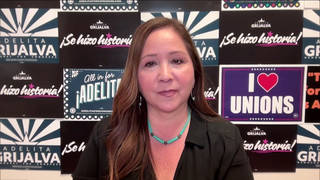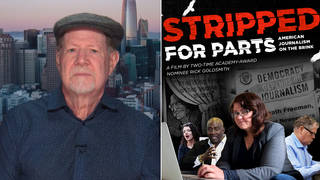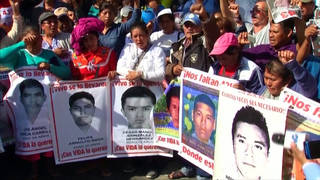
Guests
- Sister Consuelo MoralesCatholic nun who works in Mexico to defend victims of human rights violations and hold their abusers accountable. In 1992 she helped found the group Citizens in Support of Human Rights.
- Nik SteinbergHuman Rights Watch’s senior researcher for the Americas. The group recently issued a report, “Mexico’s Disappeared: The Enduring Cost of a Crisis Ignored.”
We look at the drug war in Mexico and efforts to demand accountability in thousands of cases of people who have been kidnapped, tortured, disappeared and killed. Newly declassified cables from U.S. embassies and consulates in Mexico reveal how drug cartels there have operated with “near impunity” in recent years. In many cases they are exerting control over government authorities and entire regions as they kidnap and kill anyone at will. Human Rights Watch meanwhile has found that Mexican security forces participate in enforced disappearances as part of the so-called “war on drugs” and then try to cover up their complicity. We are joined by Sister Consuelo Morales, who has helped lead the fight in Mexico to defend victims of human rights violations and hold their abusers accountable. In 1992, Morales helped found the group Citizens in Support of Human Rights, which has taken the lead in documenting human rights violations carried out by the drug cartels and the Mexican security forces, and provides support for victims. She recently received Human Rights Watch’s 2013 Alison Des Forges Award for Extraordinary Activism. We are also joined by Nik Steinberg, Human Rights Watch’s senior researcher for the Americas and co-author of their report, “Mexico’s Disappeared: The Enduring Cost of a Crisis Ignored.”
Transcript
JUAN GONZÁLEZ: We turn now to the drug war in Mexico and efforts to demand accountability in thousands of cases of people who have been kidnapped, tortured, disappeared and killed. Newly declassified cables from U.S. embassies and consulates in Mexico reveal how drug cartels have operated with near impunity in recent years. The new cables show U.S. authorities knew that narcotrafficking organizations are operating with, quote, “near total impunity in the face of compromised local security forces.” This follows a report by Human Rights Watch that similarly documented how Mexican security forces participate in enforced disappearances as part of the so-called “war on drugs.” In nearly all of the cases the report documented, authorities tried to cover up their complicity.
AMY GOODMAN: For more, we’re joined by Sister Consuelo Morales, who has helped lead the fight in Mexico to defend victims of human rights violations and hold their abusers accountable. In 1992, she helped found the group Citizens in Support of Human Rights. It’s taken the lead in documenting human rights violations carried out by the drug cartels and the Mexican security forces. It also provides support for victims. She recently received Human Rights Watch’s 2013 Alison Des Forges Award for Extraordinary Activism, which brings her to the United States, and our studio here in New York.
We’re also joined by Nik Steinberg, Human Rights Watch’s senior researcher for the Americas, helped author their report, “Mexico’s Disappeared: The Enduring Cost of a Crisis Ignored.”
We welcome you both to Democracy Now! Sister Consuelo, it’s wonderful to have you with us. Describe for this audience the problem in Mexico.
SISTER CONSUELO MORALES: It’s just when the president—the president decide to resolve the situation of drugs—of drugs, violence, taking out of the barrack to the militaries and brought to the streets, to the public security, that we start watching a very high number of violations of human rights and the violence increased so much. So, at the beginning, we have just problem, I say, on drugs, but after, we start having a very serious problems, extortion problems. And especially one that is very, very difficult, hard to manage is people who are—who have been disappeared. No, now in Mexico, we have—the government has accepted they have at least of 26,000 people who is disappeared, and this number is just a little number, but the reality is very, very big.
JUAN GONZÁLEZ: Well, about, I would say, a little more than a year ago, we had on this show Jorge Castañeda, the former foreign minister of Mexico under Vicente Fox. And we asked him about the drug war, and he said at the time that it wasn’t really as big a problem as people were making it out, that it was largely a regional problem near the border, that the rest of Mexico was continuing to function well. I’m wondering your sense, because you’re based in Monterrey, aren’t you?
SISTER CONSUELO MORALES: Yes, in the north of Mexico.
JUAN GONZÁLEZ: And to what degree the violence and the kidnappings and the disappearings have spread throughout the rest of the country?
SISTER CONSUELO MORALES: Well, what we watch in—since our small organization, is that this is—it’s a local problem in the north of the Mexico, but also that is in all the country, no? Sometimes it doesn’t show. For instance, we have been working with people who are disappearing since 2009, 2008. And it was just with the human rights report that they bring out with the president, then they start thinking that there was a problem. But people suffering in those—in social, psychological and in economic things are there, and they show the truth.
AMY GOODMAN: Nik Steinberg, after Human Rights Watch issued its report documenting 249 disappearances during President Calderón’s administration, the government acknowledged for the first time it kept a database of more than 27,000 people reported missing or disappeared. Talk about this.
NIK STEINBERG: Well, you know, during the previous administration, under President Calderón, with disappearances and with other human rights abuses, the line was that there were no human rights abuses, that the military and the police didn’t commit abuses, that they were committed by cartels, and that the victims were members of cartels. The admission by the new government, by the Peña Nieto government, which took over at the end of last year, that more than 27,000 people were missing or disappeared is a very important one, because it acknowledges the scale of the problem. What it doesn’t do, and what this administration hasn’t done, is said what they’re actually going to do to investigate these cases. And that’s a very important question.
AMY GOODMAN: Well, in October, Attorney General Jesús Murillo Karam said most of those reported as disappeared have been found, that the number of those who remained unaccounted for is, quote, “much less than the figures that are being cited.”
NIK STEINBERG: Yeah, you know, I think it’s—this has been a line from the Peña Nieto administration since it released this list, has been now to downplay the problem and say, “Look, we’re going to find most of these people. Most of these people are people who left with a significant other or tried to migrate to the U.S.” But they’ve never provided any empirical evidence of this claim. And, in fact, what we know from working with the families of the disappeared is that all of the cases that we’ve documented, the authorities have done nothing to take the basic steps to bring to justice security forces or members of organized crime who have committed these abuses. So, we don’t see the evidence. We hear a lot of talk about this, but we haven’t seen anything to actually prove this.
JUAN GONZÁLEZ: And, Consuelo Morales, I’d like to ask you about this—the victimizing of migrants who were either passing through Mexico—some of the cables are just astounding that were released recently from the U.S. consulate. For instance, here in Matamoros, they’ve reported, on August 22nd of 2010 that 75 migrants were stopped by an unknown number of organized crime figures and transported under guard to San Fernando. An Ecuadorean male who survived the massacre described how, before the killings, some of the victims were offered an opportunity to work for the Zetas, one of the drug gangs, as assassins. After all but one of the group turned down the offer to work for the Zetas, the survivors stated that 54 men and 15 women were subsequently executed. This enormous toll that’s occurring of the people just migrating through Mexico to get to the United States, can you talk about what you’ve found?
SISTER CONSUELO MORALES: Well, this shows that the talk about numbers must let us know the situation, no? The situation that so many people that were or are on the list is because the families demand for justice. But most of the people, they do not do go to the authorities to ask for demand for justice. With the people who is coming through our country, it is very dangerous. Why? Because the organized crime is taking the power and making whatever they want, no? Sometimes, or many times, with the support or the participation with the authorities. We cannot explain this without the participation of authorities.
AMY GOODMAN: And you’ve had a number of those authorities arrested. A few years ago, the L.A. Times wrote, “Remarkably, Sister Consuelo’s efforts have led to the arrests of 15 people, including police and government officials, in [just] four months.” How do you do it?
SISTER CONSUELO MORALES: I lost the—
AMY GOODMAN: How do you get government officials arrested?
SISTER CONSUELO MORALES: Well, we say that there is a disappearance when the authorities detain somebody for—from a legal or illegal form, but after that, they deny, or they say, “We don’t know what happened with him,” or, “It wasn’t true.” So, what we do in CADHAC is that we take and we documented the cases, so we know that at least 30 percent of the cases, the number of people that we have like disappeared, have been done by—also with the help of the support of authorities.
JUAN GONZÁLEZ: And, Nik, I’d like to ask you about this whole question of the U.S. government policy, whether it’s the DEA or other—or agencies that work with the Mexican government in the drug war—we have 100,000 people now, supposedly, dead in this drug violence. What’s the United States government not doing that it could be doing?
NIK STEINBERG: So the U.S. has given more than $2 billion in aid to Mexico for its war on drugs since 2007. This actually started in the Bush administration; it’s continued uninterrupted under Obama. What the U.S. did when it created this program, called the Mérida Initiative, is they put in human rights conditions, and they said that 15 percent of these funds would be withheld every year pending approval that Mexico had met these conditions. Now, the unfortunate thing that’s happened is the U.S. wrote beautiful human rights conditions. They go right toward some of the biggest problems in Mexico, like the fact that soldiers that commit abuses are prosecuted in the military justice system. What has gone wrong is that every year the State Department produces a report, that if you read it without reading the cover page, you would say, “Absolutely, the U.S. is not meeting these—Mexico is not meeting these conditions.” And every year, the State Department and Congress rubber-stamp these funds, and they release the money to Mexico. Now, the problem is that that sends the message to Mexico that, you know, we may put these conditions in there, but to us they’re not important enough to actually withhold any money. So, the U.S. has been a partner of Mexico in this. The U.S., as the cables reveal, knows that serious abuses have been committed. And the U.S., for the most part, has been entirely silent on this problem in Mexico.
AMY GOODMAN: What would it take?
NIK STEINBERG: It would take leadership at the highest levels. You know, Obama has gone to Mexico repeatedly under the Calderón administration. He went to meet with President Peña Nieto. His only statement on human rights has been standing next to President Calderón to say the real human rights abusers in Mexico are the cartels. He’s never once publicly, on the record, said that Mexican security forces, be they soldiers or police, have committed abuses or that there’s a serious impunity problem. Now, that is from the top down. And when you don’t have the president saying it, no one else is going to say it.
AMY GOODMAN: Sister Consuelo, what gives you hope?
SISTER CONSUELO MORALES: We have hope. And we have hope because when we receive people—mothers, fathers, brothers—that are looking for their loved ones, even they are afraid, even they are threatened, they still looking for justice and for the truth. And we think, meanwhile, there is—there is hope. We have to work for it.
AMY GOODMAN: Sister Consuelo and Nik Steinberg, thanks so much for being with us. Sister Consuelo Morales works in Mexico to defend victims of human rights violations and hold their abusers accountable. She’s the founder of Citizens in Support of Human Rights. Nik Steinberg is with Human Rights Watch.












Media Options